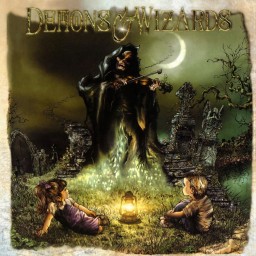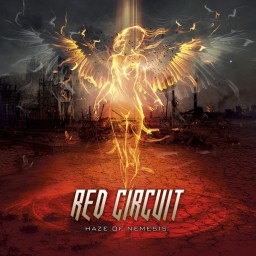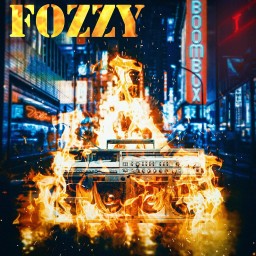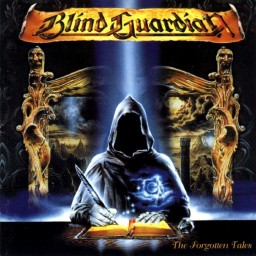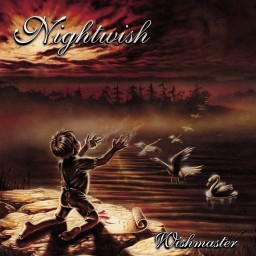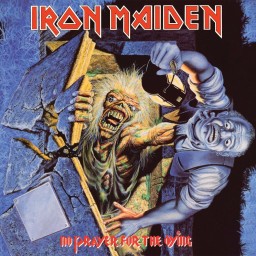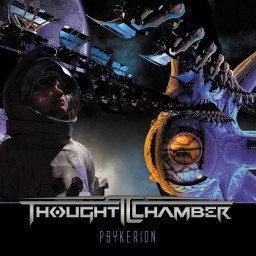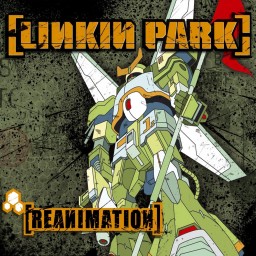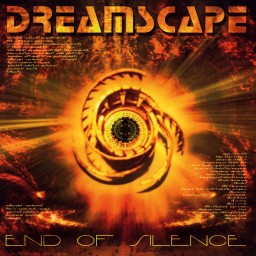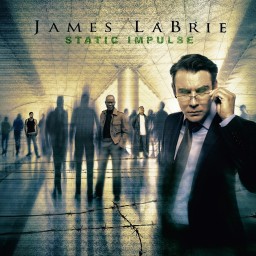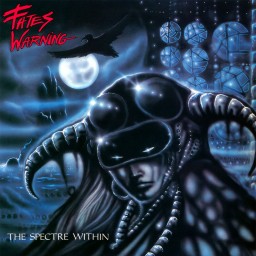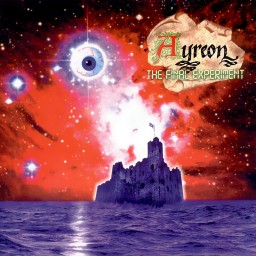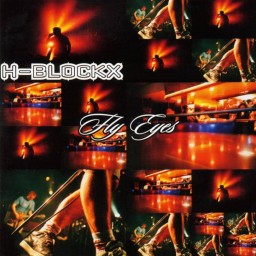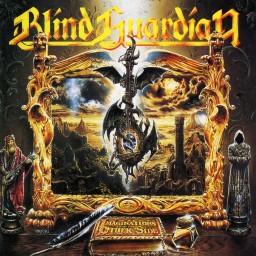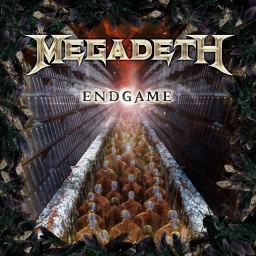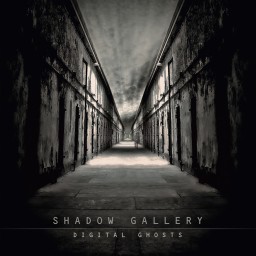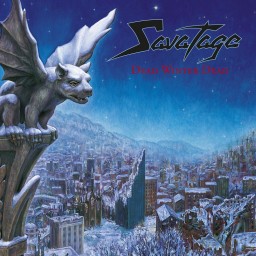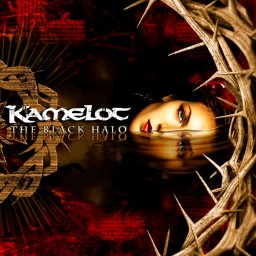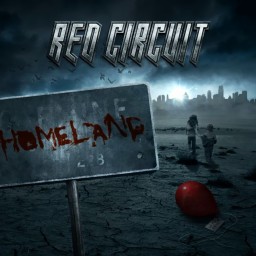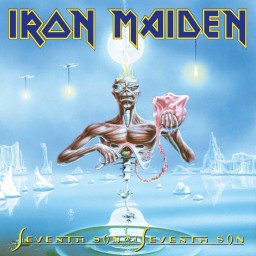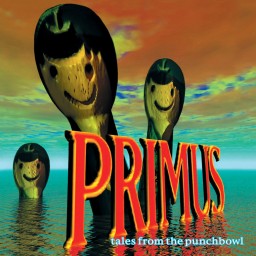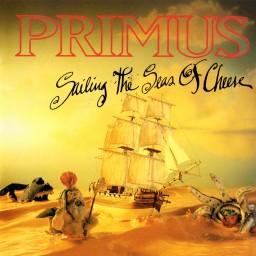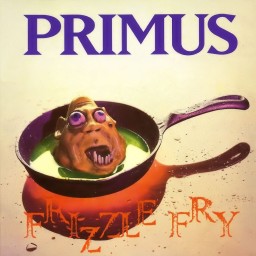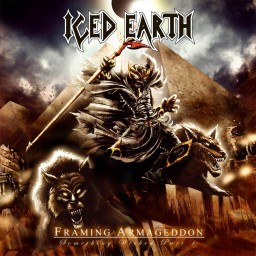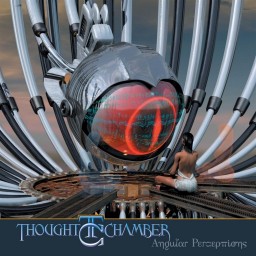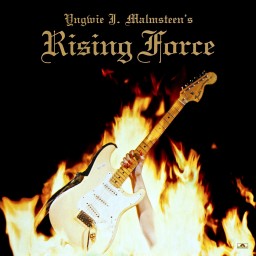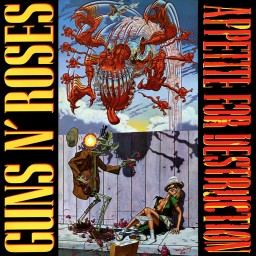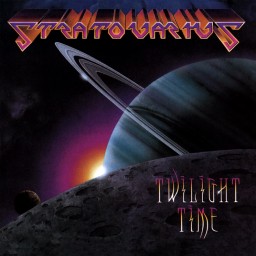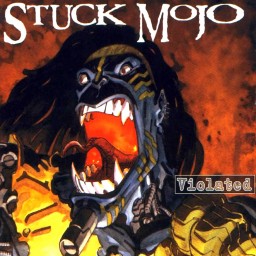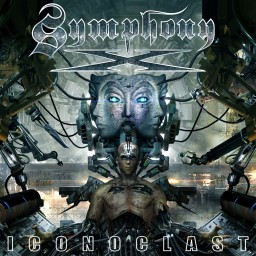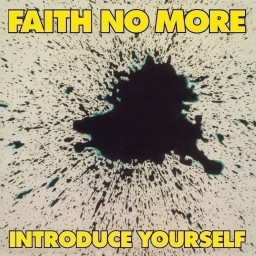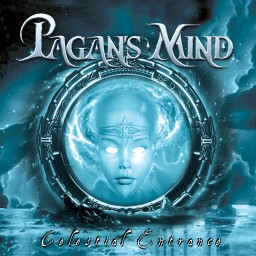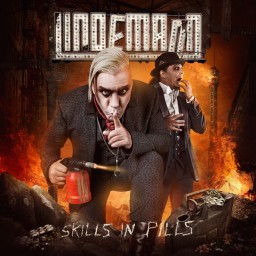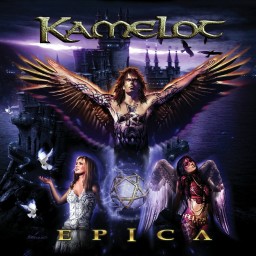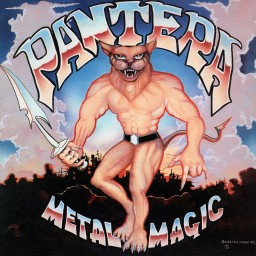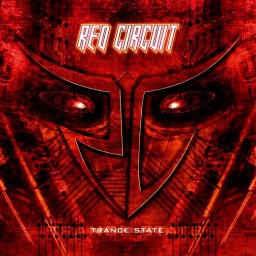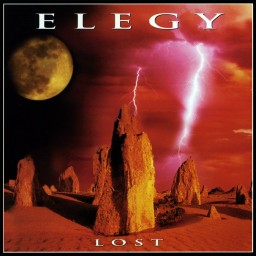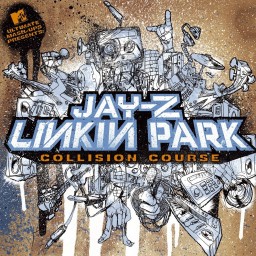MartinDavey87's Reviews
Released in 1999, ‘Demons & Wizards’ is a power metal collaboration between Jon Schaffer of Iced Earth, and Hansi Kürsch of Blind Guardian. Any band featuring two such prominent names within the power metal community could be amazing, and this SHOULD be amazing, but sadly, it fails to live up to its full potential, leaving us with something that sounds exactly as you’d expect; Iced Earth music with Blind Guardian vocals.
And that’s not necessarily a bad thing, but the problem is that this is just so damn average. There’s plenty of high-energy metal thrashing, galloping guitar riffs, epic orchestrations and Gregorian chants (like, who asked for these?), but amongst all of that, there’s only a number of truly memorable songs.
There’s no doubting that tracks like ‘Heaven Denies’, ‘Poor Man’s Crusade’, ‘My Last Sunrise’, and ‘Fiddler On the Green’ have all the makings of power metal classics. But the rest, well, they’re all pretty forgettable. And it’s a huge shame, because this had the potential to be an absolutely classic album, but sadly, for whatever reason, it’s not.
Genres: Power Metal
Format: Album
Year: 1999
‘Haze of Nemesis’ is the third album by German progressive metal band Red Circuit. It was released in 2014, five years after its predecessor, and follows on exactly where the band left off, with plenty of explosive, high-energy tracks, centred around massive sounding guitar riffs, atmospheric keyboards and the incredibly powerful voice of renowned Sri Lankan singer, Chity Somapala.
Unlike the bands previous two outings though, ‘Haze…’ does seem a bit samey after a while. That’s not to say it’s bad, but this sounds almost identical to everything the band has done before, and the seeming lack of variety does get a repetitive.
Still, it’s not all bad, as there are some absolute bangers here. ‘Oceans Apart’, ‘My Lonely Heaven’, ‘Serpent’s Smile’, ‘Believing a Lie’ and a cover of Peter Gabriel’s ‘Digging in the Dirt’ are all fantastic reasons to give this album a chance. And with a great production that really makes every song sound absolutely huge, there’s no denying that, although the band stick to their established formula, they do it very well. So why change what isn’t broken?
Genres: Progressive Metal
Format: Album
Year: 2014
‘Boombox’ is the eighth studio album by American hard rockers Fozzy. Released in 2022 and coming off of the huge success of their 2017 release, ‘Judas’, the band, who have been on a constant upward trajectory since their 1999 conception, have played it pretty safe with this one, and followed in the same vein as their previous album.
The brainchild of wrestling superstar Chris Jericho (the best in the world at what he does), and Stuck Mojo mastermind (and my hetero man-crush) Rich Ward, I don’t think anyone back in 1999 would have expected the band to still be around doing this as long as they have been. But they’ve overcome comedy cover band antics, being named after one of the Muppets, and being more than simply “Chris Jericho’s band” to become a very legit, very authentic group of musicians.
But while the last few albums have been absolute bangers, it feels with ‘Boombox’ the songs just aren’t all up to par. And I don’t mean that to sound horrible (and I don’t want to make the list!!!), because Fozzy are one of my all-time favourite bands! Literally every album they’ve released has been of exceptional quality, and while this one certainly has its moments, I do find myself preferring to go back to any of their previous outings instead.
Still, the likes of ‘Sane’, ‘Nowhere to Run’, ‘I Still Burn’, ‘My Great Wall’ and ‘Purifier’ are all remarkable songs, and with an excellent production and a pretty sick sleeve artwork, this is still a very solid album. And while it may not their best, it’s still definitely worth owning for rock and metal fans, and plenty worthy of the name Fozzy.
Genres: Alternative Metal
Format: Album
Year: 2022
‘The Forgotten Tales’ is a 1996 compilation album by German power metal band Blind Guardian. Rather than a retrospective look over their five-album career (at that point), this gathers up all the loose ends, in particular, singles b-sides and bonus tracks from various different releases, but of course, there’s a number of new recordings too. Varying from covers, acoustic renditions and live recordings, it’s quite a mixed bag, but it’s very definitely Blind Guardian through and through.
The covers in particular, are all pretty fantastic. Paying homage to the likes of the Beach Boys, Mike Oldfield, Queen, Little Richard and Uriah Heep, these are unlikely artists to cover, but the Germans have stamped their sound all over them, and truly made these songs their own.
There are also live and orchestral versions of some Blind Guardian classics, and again, these work wonderfully. Especially considering the themes of the music, they really add a new depth to the bands writing and ability to tell stories.
Overall, this might be a bit hit-or-miss for casual listeners, but for die-hard Blind Guardian fans this is an absolute treat. Tracks like ‘Surfin’ USA’, ‘Mr. Sandman’, ‘Barbara Ann’ and ‘To France’, as well as new renditions of ‘Bright Eyes’, ‘Mordred’s Song’ and ‘Lord of the Rings’ are all excellent reasons to get this album. And while the band would delve into more ambitious, progressive territory after this release, this works as a great bookend at that point of their career.
Genres: Power Metal
Format: Album
Year: 1996
Released in 2000, ‘Wishmaster’ is the third album by Finnish symphonic metal band, Nightwish. It comes two years after its predecessor, ‘Oceanborn’, and pretty much continues in the same vein. At this point the band was just beginning to break into the mainstream, and it’s easy to see that the strength and quality of their writing was garnering them a bigger and better reputation with metal fans.
The musicianship on this album is fantastic, with particular praise going to keyboardist Tuomas Holopainen and guitarist Emppu Vuorinen. The chemistry between these two is exceptional, with plenty of intense guitar riffs and a flurry of complex keyboard melodies blending together with ease. And amidst it all, singer Tarja Turenen’s operatic vocals suit the style of music perfectly.
‘The Kinslayer’, ‘She is My Sin’ and the title track, ‘Wishmaster’, are all absolutely fantastic songs, and could easily rate as some of my Nightwish favourites, and the rest of the album is filled out nicely with the likes of ‘Crownless’, ‘Fantasmic’ and ‘Wanderlust’. Other than one or two fillers, the album flows effortlessly.
Overall, this is a strong follow-up to ‘Oceanborn’, and a step in the right direction for the band, and although it may not be Nightwish’s best album, there’s some very strong tracks that make this an album worth owning.
Genres: Power Metal Symphonic Metal
Format: Album
Year: 2000
By 1994, metal in the mainstream was dead. Grunge had taken over, and other than a select few torch-bearers keeping the flame alive, most metal bands had either gone underground, gone grunge, or simply gone away. Then a band from Bakersfield, California came along, and changed all of that.
There’s no denying the impact Korn had on the metal genre. They were ahead of their time, and pioneered what would become nu metal, thus given heavy music a lifeline and appealing to a whole new audience. Their sound captured the angst, moodiness and self-loathing of grunge, but combined with the heaviness and attitude of metal.
But listening to this today, damn, this hasn’t aged well!
Back during my teenage years, I, like many newcomers to the metal and rock genre, loved Korn! They were edgy, dangerous and exciting, and any school kid who was bullied, felt rejected or left out could relate to them. Their low-end guitar riffs, percussive rhythm and Jonathan Davis’ unique blend of singing, shouting, rapping and scatting (is that what it’s called?) were totally unique! And that album cover is still as striking and eerie as it was back in 1994.
But listening to ‘Korn’ today, I’m surprised how quickly I got bored by it. Sure, it’s got classics such as ‘Clown’, ‘Shoots and Ladders’, and of course, ‘Blind’, with its famous opening line. But honestly, I really struggled to sit through this all the way. Every song just sounds the same and plods along. And I know that’s kind of common for most Korn albums, but I just seem to remember loving this when I younger. I guess I’m just not that young anymore. Sorry guys…
Genres: Alternative Metal
Format: Album
Year: 1994
Iron Maiden’s eighth studio album, 1990’s ‘No Prayer For the Dying’, takes the band into the 90’s scratching and clawing against shifting trends and fashions. Following on from what is arguably one of their most popular releases, ‘Seventh Son of a Seventh Son’, the band step away from dabbling in prog territory, and go back to more standard heavy metal. Yeah, the early 90’s weren’t great for metal bands, but Maiden sure weren’t going down without a fight!
It should be noted that by this point, vocalist Bruce Dickinson was not enjoying Maiden as much as he use to, and guitarist Adrian Smith had left the band prior to this, to be replaced by Janick Gers. I’m not really sure how much bearing this has on the writing though, as, personnel issues aside, this is still a very typical Iron Maiden album, and fans of the band will know what to expect.
The production and song-writing is pretty much the same as before. The guitar playing is fantastic as always, and Steve Harris’ formidable galloping style gives the album an almost palpable energy. However, having gone back to their more traditional metal sound, the songs themselves are of varying quality. While there are some absolutely fantastic tracks, there’s a fair few filler ones too.
But the good tracks? Damn, these are excellent! ‘Holy Smoke’, ‘No Prayer For the Dying’, album closer ‘Mother Russia’ and arguably one of the bands best tracks, with an exceptional vocal performance by Dickinson, ‘Bring Your Daughter… to the Slaughter’, are all reasons why, despite Maiden’s (and metals) waning popularity at the time, this is still a solid album, and a worthy addition to any collection.
Genres: Heavy Metal
Format: Album
Year: 1990
‘Psykerion’ is the second studio album by progressive metal supergroup, Thought Chamber. Released in 2013, it comes six years after their debut, and follows on closely in both sound and style. I must admit though, this has been a long, slow burner for me. I’m not sure what it is, but this has been on my playlist for well over a year now, and I’m still struggling to pick out any notable, single tracks.
The album as a whole is a great listen though. Full of virtuoso musical performances, Ted Leonard’s incredible voice, and excellently produced, it’s a joy to listen to from start to finish. When I can be bothered, that is. Because unlike its predecessor, I can’t really pick out any particular songs here that I’d want to listen to by themselves. I’m not sure if that’s because their strength is as singular pieces of a bigger puzzle, or maybe I’m just finding that every song blends into the next so well, it all just seems like a blur.
Still, I’m somewhat disappointed because I’d love to be able to just pick out any songs on a whim to listen to, but I feel like I can’t do that here. ‘Light Year Time’, ‘Xyrethius II’ and ‘Transcend’ are probably highlights for me, but not enough that I’d listen to them by themselves. And it’s a shame, because I genuinely do like this album, and think Thought Chamber are a fantastic band, I just don’t think I’m likely to come back to this one very often.
And it’s a concept album too! What the hell is the story to this? Because none of it makes sense to me!
Genres: Progressive Metal
Format: Album
Year: 2013
I’ll give Linkin Park credit. For a (at the time) young band, they really were getting their money’s worth out of their debut release, ‘Hybrid Theory’. As if they hadn’t already sold millions upon millions of copies of the album, and probably millions of hit singles (back when artists could actually make some money out of singles sales), now they were going to make millions upon millions with a remix album.
But is it any good? Actually, yes, it is. I feel bad rating it a two, because it’s actually a pretty decent album. This is, in some ways, what ‘Hybrid Theory’ would sound like if it was more hip-hop oriented. With plenty of guest vocal appearances by numerous rappers and nu metal singers, as well as some remix credits by a number of notable industrial artists, it’s quite a varied and interesting line-up of contributors.
But the thing with ‘Reanimation’, is that, while the album flows well and is easy enough to listen to, there’s only two tracks I’d really consider coming back to. All the others, well, I’d rather just play the actual ‘Hybrid Theory’ album. And while I don’t really mean this as a detriment, this has been on my playlist long enough with me being uncertain what to rate it. So I really can’t judge it any better than “it’s okay”.
Still, the two songs I like, ‘Wth>You’ and ‘My<Dsmbr’ are both fantastic, and can stand by their own merit as more than just remixes. The rest… well, they’re good, but passable. In all honesty, I just don’t know what else to say. This definitely belongs in every Linkin Park fans collection, I just don’t think I’m likely to listen to it very often. If ever.
Genres: Alternative Metal
Format: Compilation
Year: 2002
I fell in love with this band after hearing their 2005 release ‘Revoiced’, a compilation of tracks from their first two albums, re-recorded with then-current vocalist Roland Stoll. Yeah, you could get away with calling it “generic progressive metal”, but whatever, I think it’s fantastic, regardless. So going back through the bands discography, the first two albums were pretty good. Nothing amazing, but certainly worth owning. I think with ‘Revoiced’ they definitely picked out the best tracks both had to offer. Which brings us to their third studio album, 2004’s ‘End of Silence’, and the verdict is not good.
I do really like this band, and I wanted to give this a fair chance, but it’s been on my playlist for well over a year now (maybe even two), and it’s just not working! I’m struggling to really get into it. The musicianship is fantastic, the production is great, everything is as it should be. Except… well, the songs are pretty boring.
Of the nine tracks, there’s only two that I like, or that I can even recall for that matter, and that’s ‘Short-Time News’ and ‘You Don’t Know Me’. Both have some nice melodies and vocal lines, but overall, are still pretty passable. I don’t know what I’m missing. It just feels like everything else plods along at the same pace, with nothing overly interesting happening. Just a horrible, sludgy mess of some poorly executed prog metal ideas.
Sorry Dreamscape. Think I’m going to skip this one and listen to ‘Revoiced’.
Genres: Progressive Metal
Format: Album
Year: 2004
2010’s ‘Static Impulse’ is the second solo album by Dream Theater vocalist James LaBrie (not counting his previous Mullmuzzler albums, which are often considered a solo project). Whatever foundations LaBrie laid down on his first album are well and firmly smashed to pieces with this, as he now goes in a much darker and heavier direction than before, giving us one of the most intense Dream Theater side-projects out there.
Of course, this is also in part thanks to the musicians he has surrounded himself with. Once again teaming with guitarist Marco Sfogli and long-running keyboard buddy Matt Guillory, LaBrie already has a good chemistry with these guys. But it’s newcomer Peter Wildoer on the drums, with his death metal background, that ups the ante with the heaviness, incorporating a large amount of growling vocals.
But the amazing thing is that it fits perfectly with LaBrie’s clean vocals.
Although this album fits comfortably in the progressive metal genre, the songs mostly follow a standard song structure. But the writing is solid and the performances are incredibly tight and precise. There’s an awesome synergy between everyone here, and it shows. And while LaBrie’s aging voice might struggle on stage, on record, it’s an absolute joy to listen to.
With highlights including ‘One More Time’, ‘Mislead’, ‘Jekyll or Hyde’, ‘Coming Home’, ‘I Need You’, ‘Euphoric’ and ‘Over the Edge’, this is more than just another solo outing, this is a fantastic album, by a very legit band, and while there’s no doubting that Dream Theater will always be LaBrie’s “home”, I really hope to hear more from this line-up of musicians.
Genres: Progressive Metal
Format: Album
Year: 2010
‘The Spectre Within’, released in 1985, is the second album of American progressive metal pioneers Fates Warning. One of my favourite bands for a long time, I must admit to struggling with their earlier material. Their first album, ‘Night On Bröcken’ was mostly forgettable in my opinion, and other than one or two moments, I found it difficult to really pick out any major highlights. Sadly, ‘Spectre…’ is no different.
It’s not that I don’t like it, but damn, this has been on my playlist for over a year, and I still feel like I’m not overly familiar with it. Perhaps I’m just busier than I think I am, but I just zone out whenever I play this. And it’s a shame because it’s not a terrible album.
Further laying the foundations of progressive metal, the performances on this record are of a high standard. With some tight guitar playing and fantastic displays of vocal prowess by singer John Arch, but sadly, there’s only really two songs that I like, and that’s ‘Without a Trace’, and ‘Apparition’. The rest just sounds like they could be Iron Maiden b-sides.
And it’s a shame. Because I genuinely love this band, but then I guess not every album is perfect! I’d like to stress that I don’t think this album is awful by any stretch, but I would much, much rather listen to ‘Parallels’, ‘Inside Out’, ‘Disconnected’, or one of my all-time favourite albums, ‘A Pleasant Shade of Gray’. So that’s what I’ll do.
Genres: Heavy Metal Progressive Metal
Format: Album
Year: 1985
I loved ‘Load’. I loved ‘Reload’. I didn’t mind when they did a covers album, or played with an orchestra. And I was one of the 17 people (including the band themselves… maybe) who actually liked ‘St. Anger’. But with ‘Lulu’, Metallica (and Lou Reed, for that matter), have finally achieved their goal of making one of, if not THE, absolute worst album in music history.
The collaborative project between musical giants Metallica and Lou Reed, ‘Lulu’ is a 2011 concept double-album, and while the project initially sparked people’s interest, the results very quickly became the subject of universal criticism.
And rightfully so.
I always give every album a fair number of listens, even ones I don’t enjoy, hoping that something might just click or pique my interest after multiple listens. I listened to ‘Lulu’ three times, and it’s been the three most tedious experiences I’ve had to endure. The songs are boring, the lyrics are awful, and the mash-up between Metallica’s heavy metal and Lou Reed’s weird style of talk-singing, or sing-talking, just don’t work.
Musically, the album COULD have been okay. If James Hetfield was singing and this was another Metallica foray into alternative or art rock, it might have been listenable. But it’s not. There’s lyrical gems like “I would cut my legs and tits off when I think of Boris Karloff”, and a song where Reed spends eight minutes asking “why do you cheat on me”, and the whole time I hearing this, I’m picturing Lars Ulrich at some art gallery, trying to be all deep and introspective. But in reality, this is all an absolute pile of nonsense.
Nothing can redeem this album, and the only reason I have to keep it in my collection is because it’s Metallica, and I have some rubbish OCD collector thing going on, that makes me need to keep it. Just don’t even bother.
Genres: Heavy Metal
Format: Album
Year: 2011
‘The Final Experiment’ is the debut album by legendary progressive metal outfit, Ayreon, the band pseudonym of multi-instrumentalist and songwriter Arjen Anthony Lucassen. I use the term “legendary” because Ayreon albums have not only gone on to garner huge fan adulation and respect, but have become known for utilizing a wealth of musicians from various genres, thus displaying a high standard of quality and musicianship.
However, that’s now. Back in 1995, Lucassen was pretty much unknown, and was just starting to put this little project together. Not being able to pick from an unlimited pallet of musicians like he is today, almost everyone on this album is also relatively unknown, and are mostly friends from Lucassen’s homeland, the Netherlands.
And so with that said, this album is nothing more than laying the foundations of what’s to come. The huge medieval science fiction concept is in place, and it’s clear the musical direction is in the vein of traditional progressive metal, though with an underlying folk influence. However, for all the pomp and pageantry, I do find this album to be pretty forgettable. There’s only a handful of songs I’d really consider coming back to, such as ‘Eyes of Time’, ‘Sail Away to Avalon’ and ‘Ye Courtyard Minstrel Boy’, which are all remarkable, but otherwise, I would much rather listen to any of Ayreon’s later releases.
But for what it’s worth, this is still an album worth owning, if nothing more, than because it’s the start of a huge rock opera that will go on to span many albums over many years. But much, much better things are on the horizon for this Dutch project.
Genres: Progressive Metal
Format: Album
Year: 1995
Released in 1998, ‘Fly Eyes’ is the third studio album by German rockers H-Blockx. It follows their previous two outings, which were solid rap-rock albums revelling in the early 90’s sound and style. However, ‘Fly…’ sees less emphasis on the rapping, and leans more stylistically in the vein of late 90’s MTV-inspired radio-friendly hard rock. (That was a mouthful!)
It’s not all bad though, I mean, yeah, it’s different than the aggressive and kind of quirky sound that H-Blockx had on their previous releases, but at the same time it still sounds like the same band. They play well together, and are good at writing catchy, memorable rock anthems, with highlights being ‘Fly’, ‘Stars’, ‘Even Goes’, ‘Liquid Sunlight’ and ‘Without You’.
Chuck in a few excellent guitar solos, confident vocals and a solid production, and you’re left with a fine slab of 90’s rock. There’s really not much else to say about this one. It’ll never be my favourite H-Blockx album, but it’s good enough to come back to once in a while.
Genres: Non-Metal
Format: Album
Year: 1998
Based off of the strength of albums like ‘Nightfall in Middle Earth’, ‘A Night At the Opera’ and ‘A Twist in the Myth’, I’d long-considered Blind Guardian one of my favourite bands. However, when delving into their back-catalogue, I found their earlier albums (and it seems, their more popular amongst fans), to be fairly disappointing. I didn’t mind the speed metal influence over their music, it’s just that all the albums seemed a bit… repetitive?
With each album though, more and more non-metal influences crept in. Orchestral arrangements, folk passages, more emphasis on vocal harmonies, more story-telling, the band were becoming more and more theatrical and “epic” with each release. Which brings us to 1995’s ‘Imaginations From the Other Side’, the album where Blind Guardian really start to become the band I fell in love with.
Taking things into more progressive metal territory, the band really start to hit their stride here. Songs like ‘Mordred’s Song’, ‘Bright Eyes’, ‘I’m Alive’ and the title track all show a band who have broken out of their speed metal shell to add new flourishes to their music, and epic ballad ‘A Past and Future Secret’ demonstrates the bands orchestral arranging, with beautiful layers of music all intertwining to really bring the world of myths and legends to life.
As you can see by my rating however, while I do like this album, I don’t quite regard it as highly as others. Some people consider this one of the best power metal albums out there. I think of it as the album where Blind Guardian really start to break out of the power metal trappings and evolve into something a lot more. No doubt, ‘Imaginations…’ is a really good album, but the best is yet to come.
Genres: Power Metal
Format: Album
Year: 1995
By 2009, it’d been five years since Megadeth’s “return”, after Dave Mustaine had split the band up and retired following a well-documented injury. Upon their comeback, they unleashed two albums, 2004’s ‘The System Has Failed’ and 2007’s ‘United Abominations’. Both albums were a sure throwback to the bands earlier thrash days, with intense guitar riffs, lyrics full of distain and hatred, spewed out by a voice oozing of political unrest. This was the Megadeth of old!
However, with 2009’s ‘Endgame’, it just feels a tad repetitive already. Like the band are on autopilot and just repeating the previous two albums.
That’s not to say ‘Endgame’ is bad. It’s got its moments. It’s got all the ingredients of classic Megadeth. The playing is insanely fast, and the riffs are as intricate and intense as they were in the ‘Rust in Peace’ days. But after having this on my playlist for what feels like forever, I’m just struggling to really feel like I’d ever come back to any of these songs by choice.
And that may seem harsher than I intend it to, because there are some decent tracks on here, they just don’t, in my opinion, hold up as well to Megadeth’s previous output. ’44 Minutes’, ‘Head Crusher’ and ‘The Hardest Part of Letting Go… Sealed With a Kiss’ are all good tracks, and are worth a listen or two, but personally, I’d rather listen to anything from ‘Cryptic Writings’, ‘Youthanasia’, ‘Rust in Peace’ or even, *gulp*… ‘Risk’.
Genres: Heavy Metal Thrash Metal
Format: Album
Year: 2009
After a three-album streak of absolutely stellar releases (‘Tyranny’, ‘Legacy’, and ‘Room V’), Shadow Gallery looked to have found their niche and really hit their stride, consistently putting out fantastic albums with their own recognisable sound. Tragically, this came to halt in 2008, with the passing of vocalist Mike Baker.
Losing any band members must be hard, especially once the grieving is done, and it’s time to pick up the pieces. Do you start anew? Plod along with previously written material? And is there guilt in getting someone new to record those parts? Barely a year after Baker’s passing, Shadow Gallery were back, recruiting a new vocalist and releasing ‘Digital Ghosts’ upon us all. Sadly, it’s quite noticeable that a huge part of the band is missing.
That’s not to say this is a bad album, but I’ve really, really struggled with this one. The musicianship is excellent as always, but there’s just a huge absence of something. Call it magic? Heart? Soul? I don’t know what it is, but the song-writing just doesn’t quite seem as inspired as before. Maybe the band were just going through the motions to finish the album and move on?
With that said, there’s still a few tracks worth checking out. Songs like ‘Venom’, ‘Gold Dust’ and ‘Pain’ are all decent enough, and are worthy of the Shadow Gallery name, and there’s some good, solid progressive metal on offer here if you can be patient enough, but overall, this is far, far from the best work this band is capable of, and I think I’d much rather just listen to one of their previous albums.
Genres: Progressive Metal
Format: Album
Year: 2009
Released in 1995, ‘Dead Winter Dead’ saw a big shift in sound and style for Savatage, as well as a number of line-up changes that gave us what is arguably one of their strongest and most creative rosters, and would lead to the band forming (or joining) the Trans-Siberian Orchestra, a project that would very much parallel Savatage, but on a much, much bigger and commercially successful scale.
While Savatage had always dabbled in classical, theatrical and progressive elements within their music, 1994’s ‘Handful of Rain’ had a sound more grounded in standard hard rock. However, with ‘Dead…’, the band once more tread into rock opera territory, with a big emphasis on orchestrations and “epic” compositions, and this is none-more evident than on huge crossover hit single ‘Christmas Eve (Sarajevo 12/24)’, a massive Christmas orchestral rock anthem, which also featured on ‘Christmas Eve and Other Stories’ by the Trans-Siberian Orchestra.
Unfortunately, I do find some of the songs are pretty hit-or-miss, with a number of rather forgettable fillers popping up, but there are also a number of ‘Tage classics, such as ‘One Child’, ‘I Am’, ‘Doesn’t Matter Anyway’, ‘Mozart and Madness’, the aforementioned ‘Christmas Eve’, and the title track itself. But most importantly with this album, is that this version of Savatage, with six full-time members, would develop the style they’ve adapted here with their next two releases, which would, in my opinion, be their absolute masterpieces.
Genres: Heavy Metal
Format: Album
Year: 1995
With their previous two albums steering further and further into symphonic territory, 2005’s ‘The Black Halo’ sees Kamelot finally hit a home-run, with a concept album that shows a band who have mastered the more orchestral elements of their music, therefore completing an excellent trilogy of albums that display the perfect balance of power, progressive and symphonic metal.
Kamelot had been dabbling with symphonic and operatic influences since 1998’s ‘Siege Perilous’, and the incredible impact this would have on their song-writing would see such elements rise in prominence with each subsequent release. Giving their music rich, lavish and vibrant textures, yet staying true to their metal background, we’re taken on an epic and grandiose adventure as ‘The Black Halo’ concludes the bands interpretation of the story of Faust, a story which began on their previous album, 2003’s ‘Epica’.
While the members of Kamelot have never really been known for virtuoso instrumental performances, their musical ability here is undeniable. Everyone absolutely nails their roles, given moments to shine, yet knowing when to hold back and allow the strength of the writing to carry the song. The chemistry between them is palpable, with particular praise to guitarist Thomas Youngblood and keyboardist Michael Rodenberg. And vocalist Roy Khan is an absolute beast, no matter what he does.
The production on this album is incredible, Everything sounds so clear, perfectly balanced in the mix, from heaviness with a punch, to the orchestral warmth and ambience, and with highlights including ‘The Haunting (Somewhere in Time)’, ‘March of Mephisto’, ‘Moonlight’, ‘When the Lights Go Down’, the eerily beautiful ‘Abandoned’ and the title track itself, ‘The Black Halo’ is an absolute masterpiece, and an unforgettable musical experience.
Genres: Power Metal
Format: Album
Year: 2005
Red Circuit are back with 2009's 'Homeland', which follows in the same vein as their 2006 debut, with the only notable difference (though not entirely noticeable) being a new guitarist, a new bassist, and a much more polished sound in both songwriting and production.
What we have here is some high-quality melodic metal. Sometimes referred to as progressive metal, Red Circuit's music lacks the over-ambitiousness often associated with the genre, and instead focuses on hooks and catchy choruses. Full of breathtaking guitar work and tasty keyboard melodies, 'Homeland' is an incredible album that demonstrates why progressive metal doesn't always need to be 20-minute songs with 16/9 polyrhythmic time changes.
As on their previous album, despite overflowing with excellent musicianship, the main focus of the album is vocalist Chity Somapala, who's powerful and soaring voice really gives the band its own identity. And with only one song exceeding the five-minute mark (and only by mere seconds), each track here is short and sweet, without needing the repeated number of listens progressive metal songs usually require. This is best evidenced in songs like 'Homeland', 'Absinth', 'See the Light' and 'Canonize Your Sins'.
'Homeland' is a strong sequel to a strong debut. Catchy, heavy, and not a filler song in sight. A must-have for any metal fan looking for that hidden gem that never gets the recognition it deserves.
Genres: Progressive Metal
Format: Album
Year: 2009
‘Seventh Son of a Seventh Son’, the seventh studio album by metal legends Iron Maiden, has been on my playlist for well over a year by now. Not sure what to score it, it’s been an album I’ve constantly come back to over and over. It’s good. Sometimes it’s really good. But sometimes it’s regarded as one of Iron Maiden’s best releases, and I think that’s where it hasn’t quite met my expectations.
It’s famously referred to as the album where Maiden went more progressive and experimental, not only in song structure but by the use of keyboards. But for me, I don’t know. I just can’t get into this as easily as I could ‘Powerslave’ or ‘Somewhere in Time’. The commonly referenced keyboards are really nothing more than some backing chords over the guitar harmonies.
Regardless of that however, the musicianship is still of a high standard, and as always, praise goes to Bruce Dickinson’s soaring vocals. Despite my thoughts on the album as a whole, there are still some bangers here. In particular, ‘Infinite Dreams’, ‘The Clairvoyant’, ‘The Evil That Men Do’ and closing track ‘Only the Good Die Young’ are all classic Maiden tracks.
And at barely 45 minutes in length, it’s an easy enough album to listen to in one sitting. It’s just really not the album I’d choose to listen to in the first place. Sorry Maiden fans. I love the band, and I DO like this album, just not as much as I feel I’m supposed to.
Genres: Heavy Metal
Format: Album
Year: 1988
With their fourth album, 'Tales from the Punchbowl', Primus have finally managed to channel all their talent into something somewhat akin to a cohesive rock album. Taking their unusual style of offbeat, alternative funk rock and applying it in a more traditional rock setting, Primus have managed to produce a record that is more accessible to the mainstream public, without having to compromise their own distinct sound.
There's no other band that embodies the term "acquired taste" better than Primus, and even on a release that features some of the bands most radio-friendly material, there's plenty of their obscure (and somewhat self-indulgent) weirdness, that doesn't follow any type of traditional songwriting trait, and features an almost monotone spoken-word dialogue.
But yet, unlike previous albums, I seem to be able to tolerate it here. The odd music, the random, yet interesting lyrics, the humour... everything here just seems to work on some artistic level or another. It's like a car crash, an ugly mess but you just can't look away.
The highlights for me are 'Professor Nutbutters House of Treats', 'Mrs Blaileen', 'Southbound Pachyderm', 'Over the Electric Grapevine', and of course, the band's biggest hit, 'Wynona's Big Brown Beaver' (which is for me, like so many others, the song that introduced me to Primus). But the album flows so smoothly that even small, comedic, filler tracks such as 'Space Farm' and 'De Anza Jag' are infectious and notable in their own right.
As interesting as it is unique, Primus truly aren't to everyone's tastes (including my own), but 'Tales from the Punchbowl' is just a straight-up good album, and serves as a great starting point if you're new to the band.
Genres: Non-Metal
Format: Album
Year: 1995
Not these guys again...
There was a time in my youth when I'd have loved the quirkiness of a band like Primus. With their obscure sense of humour and their blend of rock and funk, there's truly no other band like them. But what makes them so unique is also what pretty much puts so many people off of them.
And to put it bluntly, it's mostly boring self-indulgence.
While the musicians themselves are all incredibly talented, and certainly adept at thinking outside the box, the music itself is very hard to follow, and definitely requires the listener to be equally open-minded. There's very little singing, with vocalist Les Claypool preferring more of a spoken-word type of vocal style, and a lot of the music itself tends to plod along with no real memorable melodies that stick out. As a whole, it's just a complete mess.
If I had to pick out some highlights, it'd have to be 'Tommy the Cat' and 'Jerry Was a Race Car Driver', most probably because these are the notable singles from the album, and while they do have some infectious grooves in the music, as per usual with this band, the spoken babble that is the lyrics kind of ruins them.
I'm sure there was a time when I loved this band, especially as I seem to recall asking for some of their albums as Christmas and Birthday presents in my early twenties. But I listen to 'Sailing the Seas of Cheese' now and it bores the life out of me. Primus really are in a league all of their own when it comes to "keeping an open mind", sadly, it's just not a very good one.
Genres: Alternative Metal
Format: Album
Year: 1991
It would be an absolute understatement to say that Primus is an acquired taste. Their music is incredibly obscure, with some of the most random musical passages and the most quirky lyrics you could think of. And so it is, that their debut album is a convoluted mess of ideas thrown together with no real sense of direction, other than being random for random’s sake.
While the musical ability between all the members is of a high calibre, especially bassist, singer and all-round main man Les Claypool (story goes that he was once turned down to join Metallica for being "too good"), the general compositions seem rather unfocused and boring. Nothing really stands out in this 52-minute smorgasbord of random guitar riffs and vocal melodies, which usually are delivered via something more akin to talking or just completely random noises.
If I really had to pick out any notable highlights, 'John the Fisherman', 'Too Many Puppies' and 'To Defy the Laws of Tradition' could be considered alright, but honestly, this album as a whole just gets rather boring and repetitive fast. I'm sure there are people that love songs that randomly go into renditions of 'Humpty Dumpty', but to me, it's just not cool, it's not funny, and it's not really all that clever either.
Genres: Alternative Metal
Format: Album
Year: 1990
I feel like I often have to preface all my Iced Earth reviews with an explanation of how they’re a band I genuinely love, but find their discography to be very, very inconsistent. For every absolute banger that they release, there’s a dud. Albums like ‘Iced Earth’, ‘Night of the Stormrider’, ‘Something Wicked This Way Comes’ and ‘The Glorious Burden’ all rank among some of my all-time favourite power metal albums. But then, as seems to be the pattern, here we have, what I feel is a bit of a dud.
With ‘Framing Armageddon: Something Wicked Pt. 1’, Jon Schaffer and co. revisit their most popular release, with a two-part concept album that builds upon 1998’s ‘Something Wicked This Way Comes’. Which is all fine in theory, but something about this just doesn’t resonate with me.
And it’s a huge shame, because predecessor ‘The Glorious Burden’, which saw the debut of powerhouse vocalist Tim ‘Ripper’ Owens, was a stellar release, and really put Iced Earth back on track, only to, as always, take another step back. And why? There’s nothing overly wrong with this album, but then, there’s just not really anything memorable about it, either. Other than a few snippets here and there, the only song that really sticks out is the albums lead single, ‘Ten Thousand Strong’, a short, punchy track that delivers power metal greatness in four minutes.
Other than that, the playing is of a high standard as always, and Tim Owens’ vocals are always a pleasure to listen to, but overall, I just find myself zoning out every time I try to get into this album. Perhaps it’s the rehashing of the ‘Something Wicked’ storyline (which, for the record, I have no inkling what any of it is about!), but this album just doesn’t work for me.
Sorry, Iced Earth.
Genres: Heavy Metal Power Metal
Format: Album
Year: 2007
I originally came across this band after hearing and falling in love with the song 'Transmigration of Souls', and upon finding out that their singer was none other than Enchant's Ted Leonard, I just knew I had to have this album.
One word: Wow.
After a two minute instrumental opening track, the song 'Sacred Treasure' completely blew me away, with its intro full of random guitar/keyboard/bass licks and solos, I couldn't believe what I was hearing. So many instruments playing so many different things at once. Interestingly layered melodies and harmonies make this an instant classic in my eyes.
The typical prog metal cliche is that this is very 'Dream Theater inspired', and whilst I'm not denying that, Thought Chamber have a very cool exotic style and mixture of elements which make this a truly unique group. The amazing playing and songwriting style could easily stand toe-to-toe against the genre's pioneers, and songs like 'Sacred Treasure', 'Balance of One', 'God of Oblique' or any of the instrumentals justify this.
At times Leonard's vocals seem a little thin for this style of music, but hey, I'm not complaining, it still sounds awesome. In fact, there is nothing to complain about, this is one hell of a debut, and deserves a place in every Prog fans collection.
Genres: Progressive Metal
Format: Album
Year: 2007
Yngwie Malmsteen’s 1984 debut, ‘Rising Force’, is the album that inspired a whole generation to grab a guitar and learn how to play it really, really fast, as well as giving birth to what’s known as the neoclassical subgenre, a hybrid of metal guitar playing with classical music themes. It’s a highly influential album. But does it hold up well today?
Not really.
I went into this album with some intrigue. The outspoken Malmsteen has never been too modest to tell us underlings of his superior musical abilities, so I was interested to see what the fuss was about. And to be honest, I find it pretty boring. Don’t get me wrong, he plays with absolute precision and intensity, and no doubt in 1984 this was groundbreaking stuff. But by today’s standards, it just sounds like the same recycled classical lick played over and over.
There are a few songs with vocals which aren’t too bad, ‘Now Your Ships Are Burned’ and ‘As Above, So Below’, and in this aspect Malmsteen’s playing suits the music well. But for the most part, I just find this album dull, with all the songs serving as a self-indulgent excuse to play the same guitar scales as fast as possible.
Except for one song; ‘Icarus’ Dream Suite Op. 4’.
Wow! Where did this come from?! I can tolerate mindless shredding here, because the melodies when the song slows down are incredible. The clean guitar playing, the keyboards, everything here just comes together perfectly! This song itself is pretty damn amazing, and while ‘Rising Force’ generally bores the hell out of me, this song alone is enough for me to at least come back for more and see what else the master of men can conjure up.
No doubt this is highly regarded by fans, and in particular, by other guitarists, as a classic. But it just doesn’t work for me.
Genres: Heavy Metal Neoclassical Metal
Format: Album
Year: 1984
First impressions are everything. They can determine whether people like you or hate you, and while opinions can always change over time, there’s nothing quite like a memorable first impression. So how did Guns N’ Roses make theirs? They thought it’d be a great idea to release one of the most legendary, iconic and recognizable albums of all time.
Not a bad start, eh?
Released in 1987 (the same year as yours truly), hair and glam metal was in full swing, with countless rock bands living up the 80’s, prancing around with more makeup and hairspray than an L.A. hooker. And while there were some with the odd hit or memorable album here or there, the scene really lacked that one band that would transcend the genre and make their mark in music history. Enter Guns N’ Roses.
Instantly recognizable for Axl Roses impossibly high and powerful vocals, with their sleazy, spite-filled lyrics, and iconic top hat-wearing guitarist Slash’s fast and frantic blues-inspired riffs, ‘Appetite for Destruction’ has a solid production that really brings the music to life and gives the album nonstop energy and attitude. While it has a distinctive 80’s vibe, it’s still manage to age incredibly well, and even today is a very easy record to listen to, regardless of what music you’re into.
With its legendary front cover (I’m referring to the cross and skulls one which it is most widely known for), ‘Appetite...’ contains some of rocks most greatest moments, including ‘Paradise City’, ‘Welcome to the Jungle’, ‘My Michelle’, ‘Mr. Brownstone’, ‘Out Ta Get Me’, ‘It’s So Easy’, ‘Rocket Queen’ and the monstrously huge megahit, ‘Sweet Child o’ Mine’. It took me a while to get around to really giving this record a proper chance, but now that I did, I can confirm that it does live up to its reputation.
An all-time classic, ‘Appetite for Destruction’ is one of those absolutely essential albums that should be in every music collection.
Genres: Non-Metal
Format: Album
Year: 1987
After a fairly lackluster debut, Stratovarius are back!... with another fairly lackluster album.
Now, I like Stratovarius. I really, really like Stratovarius! They're a great band with some very catchy and memorable songs. But that doesn't really show in these early releases. Two major factors that are missing from these early days are prominent keyboards, which serve on 'Twilight Time' as nothing more than the odd sound effect or embellishment here and there, and powerhouse vocalist Timo Kotipelto. Because before that, we have guitarist, songwriter and band leader Timo Tolkki singing! And while he's alright, his voice does get a little grating after a while.
There are a couple of notable moments however. Opening track 'Break the Ice' is fairly good, and tracks like 'The Hands of Time' and 'The Hills Have Eyes' are tolerable, if you can see past the cheesy power metal melodies that they're built around. The music is fast and furious, with some very tight playing and nice, shred guitar solos, but overall, these songs are mostly forgettable, especially when compared to the bands later material.
'Twilight Time' has a few things going for it that stop it from getting a one-star rating, but it’s really best to leave this to the die-hard fans.
Genres: Power Metal
Format: Album
Year: 1992
'Violated' is a six-song EP by rap metal band Stuck Mojo, released prior to the groups second album, 'Pigwalk', and originally intended only for European audiences.
The disc consists of four studio recordings, including early versions of 'Violated' and 'Back in the Saddle' (titled 'U.B.Otch' here), which would go on to appear on the 'Pigwalk' and 'Rising' albums respectively, (and much-improved, I might add). A Black Sabbath cover, and EP exclusive 'Pizza Man' are also included, and these are probably the only reasons to own this disc. Especially the latter, which is actually a really cool song, despite only being just over two minutes long!
Then there's two live tracks. Personally, I'm always sceptical about early rock releases like this with "live" songs. The quality is very raw, and the audience sound pretty fake, but either way, they're not really songs I'm bothered about.
Stuck Mojo are easily one of my all-time favourite bands, and guitarist Rich Ward is one of my absolute heroes as a musician, but overall, this release is one for the die-hard fans (and surely I'm not the only one!). The music is rough and gritty and the attitude and energy is easily apparent, but there's not really anything here that is either relevant or not improved-upon with later recordings.
Genres: Alternative Metal
Format: EP
Year: 1996
2007’s ‘Paradise Lost’ is, in my opinion, one of the heaviest albums of all time, and having developed their sound over the years from a neo-classical progressive metal act to an extremely heavy, almost power metal-sounding band, it seems Symphony X have settled on a style that suits them perfectly, as ‘Iconoclast’, the bands eighth studio album, released in 2011, follows on from its predecessor as a possible candidate for one of the heaviest albums you’ll ever hear.
What makes Symphony X so heavy, you ask? While people measure heaviness in different ways, in my opinion, it’s the “weight” of the music. The production and the sound, and in this case, the massive and beefy-as-hell guitar riffs. ‘Iconoclast’ is like a ten-ton hammer crushing a thousand skulls at once, and incredibly, despite the sheer intensity and brutality, the album is full of wondrous and beautiful melodies too.
Taking the energy of power metal and the songwriting arrangements of progressive metal, Symphony X’s music is very upbeat and ambitious. With complex orchestrations and masterful musicianship, these guys are at the top of their game, and on par with the genres finest musicians. In particular, guitarist Michael Romeo and vocalist Russell Allen have an absolute synergy rarely seen these days, with Allen’s incredibly versatile range being a perfect match for the guitar riffs.
Released on two discs, or as a one-disc edition for people not willing to spend too much dollar (I wonder how many people actually bought that one), ‘Iconoclast’ is an incredible album with very few flaws. With absolute monstrous beasts such as ‘Electric Messiah’, ‘The End of Innocence’, ‘Bastards of the Machine’, ‘Dehumanized’, ‘Children of a Faceless God’ and ‘Reign in Madness’, this shows that, while Symphony X may not feel inclined to do many classically-inspired prog epics these days, they’ve refused to relent with age, instead, getting heavier and constantly finding ways to update their sound and remain relevant.
‘Iconoclast’ belongs in every metal fans collection. Simple.
Genres: Power Metal Progressive Metal
Format: Album
Year: 2011
Released in 1987, ‘Introduce Yourself’ is the second album by alternative metal outfit Faith No More. It follows on closely to the sound and style of its predecessor, only a slightly better production sets them apart.
I wasn’t overly keen on 1985’s ‘We Care a Lot’, and honestly, I kind of struggled with this one too! The band were certainly something different and unique at the time, and their song-writing is becoming more confident, but, like many later fans, I guess I just tend to dismiss these early, Chuck Mosley releases.
Chuck Mosley, of course, is the vocalist who would be replaced after this album by powerhouse front man Mike Patton of the band Mr. Bungle. Mosley’s rap-like style worked fine, but, I guess it kind of put a limit on what the band could do, and if any band were to thrive without any limitations, it would be Faith No More.
Clutching at straws, but if I had to pick out any notable songs, there’s ‘Chinese Arithmetic’, ‘Anne’s Song’, ‘Blood’, and in particular, a re-recorded version of ‘We Care a Lot’, which is probably the only song I really care to come back to, if ever. It’s a shame, and I certainly don’t mean any disrespect to Chuck Mosley, but with this album out of the way, Faith No More can really move on to becoming the metal heavyweights that they are, while ‘Introduce…’ and ‘We Care…’ can both slip away into obscurity, at least for me, anyway.
Genres: Alternative Metal
Format: Album
Year: 1987
‘Celestial Entrance’ is the second album by Norwegian progressive metal band Pagan’s Mind. Released in 2002, it sees a vast improvement upon the groups 2000 debut, with song-writing, instrumentation and vocals all taking a huge step up in quality.
I first got into Pagan’s Mind by stumbling upon some of their music videos on YouTube, and found myself instantly digging their sound. So when my first album experience of theirs was their debut, 2000’s ‘Infinity Divine’, I was slightly disappointed. I just felt like the music wasn’t very inspired, and that vocalist Nils K. Rue (who is absolutely fantastic, by the way!), maybe hadn’t quite found his niche in the band.
That all changes with ‘Celestial Entrance’.
The band really hit their stride here, with a sound a bit more their own. With some fantastic compositions, excellent musicianship, including some remarkable interplay between the guitars and keyboards, and of course, the aforementioned Nils K. Rue, who’s vocals are incredible, and has really found their place in the music.
While a couple of the tracks are still fairly hit-or-miss, there is plenty to enjoy here. ‘Aegean Shores’, ‘…Of Epic Questions’ and ‘Back to the Magic of Childhood’ are all great tracks that are well worth repeated listens. But the true gems are ‘Approaching/Through Osiris Eyes’ and ‘Dreamscape Lucidity’. Both songs are absolute masterpieces, and the album is worth checking out for these alone. Then there’s the closing track which horribly rips off Dream Theater’s ‘Leaning to Live’, in key, melody, even the lyrics are almost identical. It’s a weirdly hilarious but forgivable way to end the album.
Overall, Pagan’s Mind will go on to release much stronger albums than this, but this is a solid follow-up to their debut, and a highly recommended addition to the collection of any progressive or power metal fan.
Genres: Power Metal Progressive Metal
Format: Album
Year: 2002
‘Skills in Pills’ in the 2015 debut album of Lindemann, the self-titled project of Rammstein vocalist Till Lindemann. Teaming up with Peter Tägtgren of the band Pain, this album feels like a heavier, more keyboard-driven and overall more ridiculous version of the aforementioned Rammstein.
The most noticeable element on ‘Skills…’ is, not only the outrageously ludicrous lyrics, but the fact that Lindemann is singing in English. Something he only did a brief few times with his main band. But the lyrics… oh my! Clearly Lindemann was somewhat filtered in his main project, because here, it’s like anything goes. Literally, there are no filters here. From drugs to abortion, and sexual fetishes involving obesity to being urinated on, absolutely nothing is off-limits.
The thing is though, I like it. It’s ridiculous and shouldn’t work, but it does. Lindemann can pull this kind of thing off, and with some incredibly heavy and ballsy music backing him, it just kind of works for him. And the musical side, all covered by Tägtgren, is incredible. Heavy and atmospheric, with some proper pumping and energetic performances, it suits the lyrics and baritone voice of his partner in crime perfectly.
With highlights including the pounding ‘Fish On’, ‘Ladyboy’ and ‘Cowboy’, the disgustingly offensive ‘Fat’, ‘Praise Abort’ and ‘Golden Shower’, or the hauntingly beautiful ‘Home Sweet Home’, this album is a flurry of utter nonsense, but well-written and down-right brilliant nonsense. Obviously this won’t appeal to everyone, but if you enjoy Rammstein and aren’t easily squeamish or offended, then this is most certainly an album worth checking out!
Genres: Industrial Metal
Format: Album
Year: 2015
Released in 2003, ‘Epica’ is the sixth studio album by symphonic power metal band Kamelot. It follows very closely to its predecessor, 2001’s ‘Karma’, with more focus on symphonic elements and orchestrations, as well as a stronger sense of melody and more polished song-writing, stepping away more and more from the traditional power metal style of their early albums, and into something a lot more epic and grandiose.
With a similar sound and production as before, ‘Epica’ sounds as rich and lavish as ‘Karma’. The musicianship is tight, with everyone performing to a high standard, and in particular, praise goes to vocalist Roy Khan for his powerful and emotional performances.
With highlights including ‘The Edge of Paradise’, ‘Center of the Universe’, ‘Lost and Damned’, ‘A Feast For the Vain’ and the beautiful ‘Wander’, there’s an abundance of great tracks here, and if you liked ‘Karma’, there’s no reason you won’t like this. And ultimately, this will lead to the next album, because if you like the direction Kamelot are heading in here, then you’ll certainly love what’s to come…
Genres: Power Metal
Format: Album
Year: 2003
I’m sure I’m not the only one who spent years believing ‘Cowboys From Hell’ was the bands first release, but alas, here we are, 1983’s ‘Metal Magic’, the true debut of glam metal/future groove metal legends Pantera.
Turns out, before becoming one of the biggest metal bands on the planet, Pantera had released four independent albums, although, unlike the heavy, gritty and downright dirty sound of their 90’s output, these were more on the glam side of things, so expect spandex, songs about partying, “Diamond Darrell”, and dare I say it… keyboards!
But despite being generally reviled by fans and even the band themselves, the truth is, these albums aren’t that bad. ‘Metal Magic’, while not exactly innovating new sounds or breaking down barriers, still has a couple of nice little rockers on it. ‘Tell Me If You Want It’, ‘Ride My Rocket’, ‘Widowmaker’ and ‘Biggest Part of Me’ are all pretty decent hair metal anthems, and considering how young the members were at this time (Dimebag was only 16!), it’s really hard to not be a little impressed.
Just a shame about the naff production.
Overall, this album won’t change your life, and my God, this is completely different from the Pantera which sold millions and millions of albums in the 90’s, so if that’s what you’re expecting then don’t bother. But ultimately this is an interesting listen to see how the band changed and evolved to become what they are, and you may even find yourself liking it.
Genres: Heavy Metal
Format: Album
Year: 1983
Considered to be somewhat of a "supergroup", Red Circuit comprises of various musicians and producers who aren't really big names in themselves, but are members or have worked with bands that people might be familiar with, for example, such as Firewind, Elegy, Adagio and Vanden Plas. The results are surprisingly good, as this is a heavy, grooving, adrenaline-fueled album, full of tasty riffs and powerful vocals.
Despite often being referred to as "prog metal", Red Circuit's song arrangements are nowhere near the complexity often associated with the genre. However, they definitely have a sound to their music that prog metal fans should appreciate. That being heavy, crunchy guitars often backed by melodic keyboard melodies, and with Sri-Lanken powerhouse Chity Somapala on vocals, this is a band that have a perfect sound to appeal to fans of most styles of heavy metal.
With ten potential anthems to choose from, there really isn't a shortage of hooks on this album. Opener 'Under the Sun' is easily one of the highlights of the album, and instantly kicks things off with ass-kicking mode turned all the way up to eleven. Other stand-out tracks include 'So Hard to be Like God', 'Search for Your Soul' and the title track 'Trance State', all choc-full of headbanging grooves to get the blood flowing.
For a progressive metal record that won't require a billion listens to become familiar with, Red Circuit's 'Trance State' really is a treat for fans of the genre.
Genres: Progressive Metal
Format: Album
Year: 2006
The riffs just really aren’t that exciting, the production sounds "tinny", and the vocals are really annoying. I don't mind high-pitched singing, but this guys inaudible voice is just irritating.
On a positive note, there are a few reasonably catchy chorus’s, and although they help me find a bit of stability in a song that I'm probably not paying much attention to, it’s really not worth listening through a few minutes of generic riffs and uninspired songwriting for the sake of a chorus.
The sad thing is, I actually quite like Elegy. But this album is just so boring and bland. There's countless progressive power metal bands out there, and there's other boring and bland albums that are better than this one. An underrated band, but you wouldn't guess it from hearing 'Lost'.
Genres: Progressive Metal
Format: Album
Year: 1995
It’s 2004, and one of the biggest rock bands on the planet, Linkin Park, have collaborated with one of the biggest rappers on the planet, Jay-Z, to produce one of the most shameless and pointless cash-grabs on the planet, ‘Collision Course’.
I mean, I like both artists, and this EP, which basically takes music and lyrics from both artists repertoire and mashes them together, does work at times, but honestly, it is just a shameless attempt to make some dollar, and given the choice I’d much rather just listen to each respective artists work.
But for what it’s worth, since Linkin Park’s music is already fairly rap-oriented, this really is just Linkin Park with a second rapper. Simple. At times the music and lyrics blend well and it’s interesting to hear what amalgamation the musicians have come up with, but at other times, it’s cringe-inducing and cheesy. But as I said before, I’d rather just listen to some actual Linkin Park music, given the choice.
I’m glad it’s not a full-length album, that’s for sure. At 22 minutes in duration (and a “making of” DVD in some cases) it’s a harmless enough EP, but overall this is just a novelty item for fans of either artist.
Genres: Alternative Metal
Format: EP
Year: 2004










